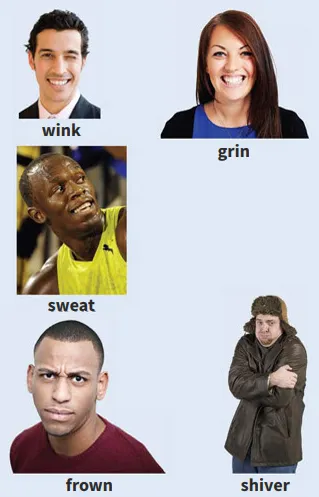A. Verbs connected with the mouth and breathing

- yawn: Why are you yawning? Are you feeling sleepy?
- sneeze: Dust often makes me sneeze.
- snore: He snored in his chair with his mouth wide open.
- cough: It was so smoky in the room that he couldn’t stop coughing.
- sigh: She sighed with relief when she heard the plane had landed safely.
- be out of breath: I ran for the bus and now I’m out of breath!
- take a deep breath: He took a deep breath and jumped into the water.
- hold your breath: How long can you hold your breath underwater?
B. Verbs connected with eating
- chew: My granny used to say you should chew every mouthful ten times.
- rumble: It’s embarrassing if your stomach rumbles during an interview.
- swallow: Take a drink of water to help you swallow the pills.
- suck: In an aeroplane, if you suck a sweet, it can stop your ears popping.
- lick: The cat licked the bowl clean.
- bite: Don’t bite that hard sweet – you’ll damage your teeth.
C. Verbs connected with the eyes and face

- wink: He winked at me across the room to try to make me laugh.
- frown: Why are you frowning? What’s the problem?
- grin: She was so delighted with the present that she grinned from ear to ear.
- blink: She blinked several times to try and get the dust out of her eye.
- blush: He blushed with embarrassment when she smiled at him.
D. Verbs connected with the whole body
- perspire/sweat /swet/: When it’s hot, you sweat/perspire. (perspire is more formal)
- shiver: Look at him! He’s so cold that he’s shivering!
- tremble: My hands tremble when I’ve been drinking too much coffee.
- shake: She laughed so much that her whole body shook.
Language help
All the verbs on this page (except shake and bite) are regular verbs; almost all the words have an identical noun form: to yawn → a yawn, to cough → a cough /kɒf/, etc. (except to breathe /briːð/ and to perspire; their nouns are breath /breθ/ and perspiration).
|


Bình luận